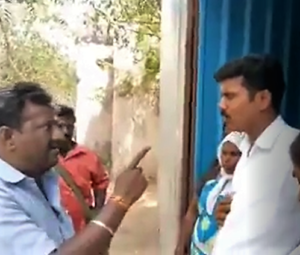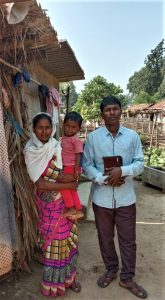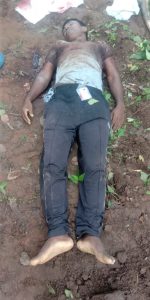This is a blog dedicated to highlight the issue of Christian Persecution in India. The posts here in contain information about Christian Persecution in India from various sources with links and some exclusive to us. No Copyright infringement is intended. This is only for the purpose of spreading awareness about the ongoing Christian persecution in India. We have no political affiliations. We hope for a nation where all could live in peace with each other.
Wednesday, July 15, 2020
Fourth Christian in Less than Two Months Killed in India
Thursday, July 09, 2020



Wednesday, June 17, 2020
Church in India Set on Fire by Suspected Radical Hindu Nationalist
According to local sources, on the morning of June 13, Pastor Ramesh saw the flames and thick smoke coming out of the church. By that time, the roof, made of coconut leaves and bamboos, was completely burnt.
“I was shocked for a moment looking at the church engulfed with flames and smoke. I was broken, and it was so painful, there was absolutely no way to save anything from inside the church. The church structure, instruments, and furniture inside the church are ten years of hard labor,” Pastor Ramesh told ICC.
Pastor Ramesh leads 100 members of the ‘Real Peace Church’ in Vaylur, Changalpattu district, for the last ten years. He explained this incident is part of persecution against Christians and their work in the district, as he also has been threatened to stop Christian practice in the region.
“After I recovered from the shock,” Ramesh said, “I filed a formal complaint with the police, and the police promised that they carry on the investigation.”
In 2017, in the same district, a pastor was murdered only 5 miles from where Pastor Ramesh leads the Real Peach Church in Vaylur. “This place has been a difficult place for Christians,” Ramesh said, “and their numerous instances where the Christians have been facing increased intimidations”.
The state of Tamil Nadu is known for its sizable Christian population yet ranked two in the national tally of the most hostile state for Christians to live. The church fire in Vaylur proves the reality of discrimination and assaults against Christians based on religion.
Click here for source
Wednesday, June 10, 2020
16 year old boy killed brutally in Malkangiri, Odisha
Police Unresponsive or Hostile toward Christians Beaten in Jharkhand, India
Wednesday, February 13, 2019
Christians Injured in Attack on Prayer Meeting in India
Friday, February 01, 2019
Church in India’s Chhattisgarh State Vandalized by Radicals
On Sunday, January 27, Calvary Gospel Ministry Church, located in Shantipur village in India’s Chhattisgarh state, was attacked by a mob of suspected Hindu radicals. As a result of the attack, the church was vandalized and several members were left injured.
The attack started at approximately 9:30 a.m. as the regular Sunday service was being led by Pastor Ajay Ravi. Around 30 suspected radicals surrounded the small church and began shouting at the 25 believers who had gathered for worship. According to Pastor Ravi, the radicals accused the Christians of insulting their gods and goddesses.
After some time, the radicals demanded that the Christians come out of the church. When the Christians obeyed, they were assaulted with sticks and fists. Ten Christians, including women, were terribly beaten by the radicals. In addition, two bibles were torn to pieces, three musical instruments were damaged, and a motorbike was destroyed.
When police were called to the scene, they suggested the assaulted Christians come to a compromise with their assailants. When the Christians refused, the police refused to register a complaint on behalf of the Christians and threatened to throw them in jail. To date, no criminal complaint has been registered against the radicals by police in Shantipur village.
“I know that I should love my enemies and pray for those who persecute us,” Pastor Ravi told International Christian Concern (ICC). “But God forgives those who confess their sins before him. Unless [the radicals] are convicted of the sin of vandalizing the church, it is not rational to compromise with the persecutors.”
Saturday, July 14, 2018
‘Total impunity’ in India, as Muslims and Christians ‘bear brunt of ruling ideology’
In Chhattisgarh, tribal leaders ask, ‘How can this be about conversion?’
Thursday, March 15, 2018
Christian prayer homes attacked in Madurai
Wednesday, March 14, 2018
Indian policeman joins 50-strong Hindu mob’s attack on churches
 |
Tuesday, March 13, 2018
Indian policeman joins 50-strong Hindu mob’s attack on churches
A Hindu mob raided five churches in the southern Indian state of Tamil Nadu yesterday (11 March), attacking and abusing Christians as they worshipped. Several women were stripped and beaten.
The attackers, who according to witnesses were accompanied by a state-provided police officer, were part of Hindu Munnani, a Tamil Nadu-based organisation formed to defend Hinduism.
The Hindu Munnani District Secretary, Thangam Venkatesh, led the mob, which began its raids early in the morning.
“At about 9am, Venkatesh went to the prayer hall and abused the pastor, Ravi Jacob. He used extremely vulgar language, and then turned on his wife, Persis,” John J.Y. Arul, Chairman of Madurai District Pastors’ Fellowship, told World Watch Monitor.
“The extremists were aggressive and uncontrollable. In front of children and others in the church, they savagely beat up Jacob and Persis. They removed Persis’ saree and repeatedly kicked her in the face,” Arul said.
“I can’t repeat the words they used against Persis. We were shocked by their inhuman behaviour.
“When Persis was crying for help, the police guard with the Munnani leader asked her to ‘prostrate herself at the feet of Thangam Venkatesh and plead for his forgiveness’.
“Persis’ face was swollen and she had to be rushed to hospital.”
The mob also burnt Christian literature, including Bibles.
“The same Hindu Munnani men went to four other churches in the district,” Arul said.
At about 10am the mob went to the Bethesda Worship Centre, where they stripped and attacked three women. Two of the women, Maariyammal, 40, and Annal, 51, were sexually assaulted. A third, Bava Dhaarani, 23, was slapped and punched. Maariyammal tried to lodge a complaint with the police, but she was told police could “only take one complaint per church” and the church pastor had already made a complaint.
The mob told Bethseda’s pastor, Jerome Jagatheesan, “you will be brutally murdered in five days”.
“Their language was filthy,” Jagatheesan told World Watch Monitor. “They called me a woman, saying if I was a man I would not serve Christ. They bullied me, calling me pottai, pottai. It is an offensive word in the Tamil language, used against transgender people and homosexuals.”
Activists in the mob said to Jagatheesan: “If you are a man, why did you convert? Why did you change your god? You are a homosexual who gives his wife to adultery.”
Jagatheesan said: “Their words were brutish. Had I uttered a single word they would have attacked us the same way sister Persis was attacked. They showed no mercy.”
The activists also said to Jagatheesan: “If you want to serve Jesus Christ, go to Bethlehem or the Vatican. Worship him there. Why do you want to make India impure?”
At the church the mob shouted threats to a 19-year-old named James, whose father, Emmanuel, leads another church. The activists called out: “If we continue gathering for Sunday worship and prayers, it will be my dad’s turn next,” James said.
“[Hindu nationalists] are ruling in the centre, it is their government. We Christians are helpless,” he added.
Another pastor, Sagi Sugathia, said the mob “are at least 25 in number and very violent. Our church services had to be stopped because of Thangam Venkatesh and his men”.
Complaints to the police
Later in the day complaints were made at Koodal Pudur and Alanganallur police stations, but police refused to register the case. Koodal Pudur police issued a Community Service Register (CSR) receipt in which they did not reveal the identity of Thangam Venkatesh and the Hindu Munnani workers.
The CSR receipt, filed on the complaint made by Jerome Jagatheesan, said: “Twenty-five unknown miscreants or unidentified people have attacked the Christians.”
Some 200 pastors later demanded that a First Information Report (a victim or witness statement made to police to trigger further investigation) was filed against the Hindu Munnani activists.
A Facebook account in the name of Thangam Venkatesh posted updates on yesterday’s attacks, including a video of Venkatesh shouting abuse at Jagatheesan.
Click here for source
Friday, December 29, 2017
Christmas violence and arrests shake Indian Christians
Thursday, June 29, 2017
Christian Families Get Beaten and Were Denied Water in India
Christian families were beaten by villagers, forced to take part in Hindu rituals and had the water for their crops cut off in the latest horrifying persecution in India. The families that were targeted in the attack are from Jalalabad village, Ghazipur District in the northern state of Utter Pradesh.
The incident happened on April 25 when a mob led by the village president and his advisers beat up a group of Christians with sticks. Pushpa Kumari, one of the victims, said the mob forced them to eat basil leaves and drink water from the Ganges River that was considered holy.
They were also made to deny Christ. At least 13 young Christians caved in to pressure and reconverted back to Hinduism. The four couples who refused were beaten up. Their water supply was also cut off, leaving their crops exposed to temperatures reaching 40 degrees Celsius.
During a confrontation at the police station, the victims were accused of forcibly converting Hindus to Christianity. One of the victims, Manoj Kumar, denied this, saying the Christians just gathered at his house on Sundays as they were unable to go to town for worship.
An amicable settlement was reached that both sides will follow their own respective religious practices peacefully, and no charges were filed. But the water problem wasn't settled. Villagers still refused to sell water from their boreholes, and the Christians' crops were left to die.
"We are ready to pay the hourly price, but the president and villagers have decided to not let us irrigate. Our field is going dry; it's burned dead," Kumar said. Last June 14, Gupta told the Christians if they want water, they have to stop following Christ and holding their worship services.
The oppression against Christians has long been common in India. In 2014, it ranked 28th on the Open Doors World Watch List of Countries where Christians faced the worst persecution. The persecutions enormously increased since then and the country is now ranked 15th.
Click Here for source


